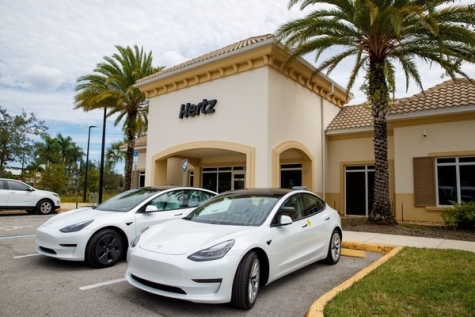Hertz announced it will continue rapidly electrifying its fleet of rental vehicles following its record earnings report for 2022.
Hertz is a clear leader in electrification in the car rental market, and buyers have responded accordingly, as Hertz reported record earnings for 2022, despite numerous setbacks in the economy. Hertz said it will continue to build on what made it so successful last year: electrification, expanded distribution and excellence in execution.
According to Hertz’s earnings report Feb. 7, the company earned $8.7 billion in revenue during 2022, $2 billion of which was earned in Q4. On top of that, Hertz had a record GAAP net income of $2.1 billion in 2022, reaching $3.36 per diluted share. Key financial contributors include a heightened EBITDA margin of 27% and increased fleet utilization globally compared to 2021.
Hertz did not have EV-specific sales or rental data in its earnings deck.
Following this revenue boom, Hertz stock jumped by more than 7%, encouraged by the continued growth of the travel industry post-COVID.
But what differentiator had made the company so profitable? Hertz CEO Stephen Scherr pointed to electrification.
“Our team delivered on renewed demand for travel, which is continuing," Scherr said. "In 2023, we will build on our progress to grow our business across the Hertz, Dollar and Thrifty brands. We look to our investments in electrification and technology to yield increasing operating leverage and improved returns and an even better product to our customers around the world.”
Hertz made shockwaves in the rental industry in late 2021, when it announced it was purchasing 100,000 Tesla Model 3s, and since then, the company has only increased its investment. Following the massive Tesla deal, Hertz ordered 175,000 EVs from General Motors and 65,000 from Polestar. The company has also partnered with BP Pulse to begin installing charging infrastructure at each rental location.
While Hertz’s earnings presentation stated it would grow its “EV fleet across multiple OEMs,” the rental agency did not specify what other automakers it may work with to purchase more EVs.
On top of these investments, Hertz has also been unique in its efforts to make its new massive fleet of EVs as profitable as possible. Perhaps the best example is the rental agency’s partnership with Uber, allowing Uber drivers to rent an EV for a discounted weekly fee.
This is to say nothing of the inherent benefits Hertz’s EV fleet has brought the brand. Last year, Hertz executives excitedly announced interest in EV rentals had shot through the roof, while reducing operating costs for the company.










Abby Andrews